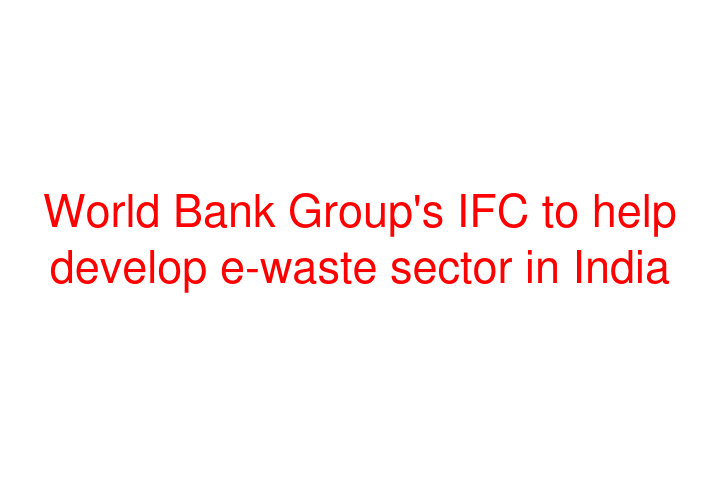 New Delhi, Nov 8 (IANS) World Bank Group's International Finance Corporation (IFC) on Wednesday said it has scaled up its programme to focus on developing a sustainable e-waste management ecosystem in India and mobilise private sector investment towards the sector.
New Delhi, Nov 8 (IANS) World Bank Group's International Finance Corporation (IFC) on Wednesday said it has scaled up its programme to focus on developing a sustainable e-waste management ecosystem in India and mobilise private sector investment towards the sector.
"In line with IFC's global strategy of 'creating markets, creating opportunities', its India e-waste programme is focused on developing a responsible and sustainable ecosystem for it in India with the end goal of mobilising private sector investment," it said in a statement.
"The complexity of implementing an e-waste management solution represents an opportunity for IFC to support the development of a sustainable ecosystem through its advisory work. The India e-waste programne will address critical gaps in the market by systematically leveraging international and local best practices in the sector," said IFC's Country Manager Jun Zhang.
"We also believe this scalable solution will create new profitable businesses in India and future investment opportunities for investors such as IFC," he added.
The Ministry of Environment, Forest and Climate Change has set the e-waste collection targets at 10 per cent during in the current year which will increase to 70 per cent by 2023 in a phased manner.
To achieve this, the IFC's project team is focusing on addressing some of the critical challenges that the sector faces such as lack of awareness among stakeholders about the magnitude of India's e-waste challenge, related hazards, implications of unsafe practices and solutions available for responsible collection and processing, it said.
"It will also focus on underdeveloped formal capacity for responsible collection and processing and the absence of data and access to best practices. The three key components of the IFC's e-waste project are awareness generation, supporting the establishment of a responsible Producer Responsibility Organisation (PRO) model and the development of a toolkit which will serve as a knowledge and data resource to support stakeholders in their implementation efforts," the statement said.
The project is also committed to supporting the formalisation of the informal sector by exploring interventions such as innovative microfinance solutions and skilling programmes.
Higher awareness levels and improved collection will result in better capacity utilisation of all entities in the value chain as well as mobilise investment for additional capacity-building to meet the growing demand, ensure greater investor confidence and make the sector more financially viable.
The PRO model has the potential to be a cost-effective channel to implement such a solution in the long-term since it capitalises on professional management and economies of scale.
Under its program, IFC has partnered with Karo Sambhav, a PRO that represents several prominent electronic producers including Apple, Dell, Lenovo and HP.
Karo's technology enabled solution aims to address the critical need for transparency in the ecosystem. This, coupled with an experienced team led by Pranshu Singhal, former Head of Sustainability for Nokia, is the basis of the partnership. IFC's partnership with Karo Sambhav is focused on awareness generation, capacity building and knowledge exchange.
The India e-waste program is supported by the government of Japan and the Korea Green Growth Trust Fund of the World Bank Group.
(This story has not been edited by Social News XYZ staff and is auto-generated from a syndicated feed.)
About VDC
Doraiah Chowdary Vundavally is a Software engineer at VTech . He is the news editor of SocialNews.XYZ and Freelance writer-contributes Telugu and English Columns on Films, Politics, and Gossips. He is the primary contributor for South Cinema Section of SocialNews.XYZ. His mission is to help to develop SocialNews.XYZ into a News website that has no bias or judgement towards any.
